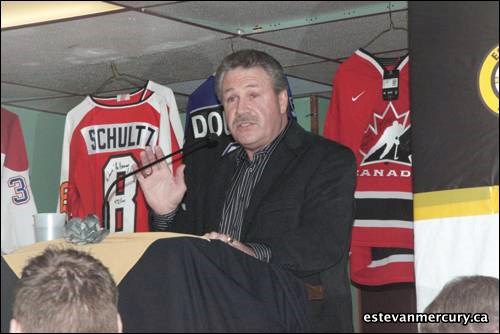"I hate fighting."
Those were the shocking words Dave "The Hammer" Schultz used to begin his address to the crowd at the Days Inn Plaza, as the main speaker at the Estevan Bruins banquet on Saturday. Schultz was the head bully of the renowned Broad Street Bullies, the Philadelphia Flyers of the 1970s, who fought for a living and recorded an NHL record 472 penalty minutes in a single hockey season.
"I hated all parts of it, except once I got into a fight, and I got hit and it pissed me off. Then I enjoyed the awards, which was the recognition and С����Ƶ part of a team and helping your teammates," he said, immediately qualifying his opening statement.
He said he wasn't always the guy who took care of business on the physical end of things. His hockey career started promising enough in junior when he scored 167 points in 136 games and was involved in two fights. He threw his first punch in his second fight.
"I had never hit anybody before and that feeling of my fist against his face; it was awful. Of course I got used to that."
Schultz talked about rule changes in the current NHL, and the Code, "a sacred covenant, unwritten rules of engagement.
"When you hit somebody, you give him a cheap shot, you got to pay the price. With all the little changes (in today's game), fighting is certainly down. Are concussions down? Are cheap shots down? My feeling is get rid of the instigator rule."
Or at least modify it, he said.
"I would never fight a guy who was going along just playing the game. I would never do that. Fighting in hockey actually protects the game's best players."
He quoted Wayne Gretzky as С����Ƶ against the instigator rule, saying he wanted protection.
"These guys are not getting protection. You can run a guy, give him a concussion, knock him out. You might get suspended, but you don't have to pay the price. Fighting a guy in front of 20,000 people is a little bit different. It changes a guy's perspective on how they're going to handle their elbows and all those kinds of things."
He noted it's rare players get hurt during a fight.
When he started with the Flyers in 1972, they were still experiencing growing pains as an expansion team from 1967. Schultz said their owner, Ed Snider, was looking for the Flyers' identity, and he found it in intimidation.
"We may not be able to find all the great scorers, but we can certainly find guys who beat up other guys up if that's what was necessary. (Snider) said I do not want to see a Philadelphia Flyers team intimidated ever again," he told his audience.
His coach, Fred Shero, told Schultz that hockey players need three things, but he only had one. Without speed and agility, he could only rely on his strength. He remembers Shero handing out cards to the players with messages on them. One read: if you do not want to be criticized, say nothing, do nothing, be nothing.
"It was pretty appropriate at that time because we were С����Ƶ criticized all over the National Hockey League."
He said it's a tough job С����Ƶ the guy who had to fight and that it's as tough for today's players as any other time in hockey.
"The pressure, and it wasn't like I only fought occasionally, and I had to win. I did. I couldn't afford to lose."
When he lost, he said it made headlines.
"The fear of getting that one punch that would hurt me really bad, and one that would make me afraid to continue (fighting). That was my biggest fear."
Schultz was preceded at the podium by Mike McCullough, a linebacker for the Saskatchewan Roughriders. McCullough spoke of his time with the Roughriders and the bright future of the franchise, warming up the crowd for The Hammer.
He also talked about the death of his son, who succumbed to Duchenne muscular dystrophy (DMD), and a local boy who has the same diagnosis.
"I lost (my son) in 2009. He passed away from DMD, a horrible muscular dystrophy disorder, and I just found out two weeks ago there's a boy here in Estevan who has it they are having a fundraiser on March 11."
He is going to send a jersey to the fundraiser to help raise some money.
"I know you guys are good at showing your support for things like this."
Bruins head coach, Chad Leslie, thanked those in attendance for supporting the awards banquet, the team's biggest fundraiser of the year. He spoke of the exit of Kerry Biette, the Bruins head coach at the start of the season.
"It's always tough when you make a coaching change, and to get someone halfway through the season. All the good coaches are coaching. It was my belief that if we want to put someone in place next year, then it's going to be best for this organization going forward. It was a leap of faith they took in me, but I think it was for the betterment of the club. And I think we're going to get a really good guy in here next year."




